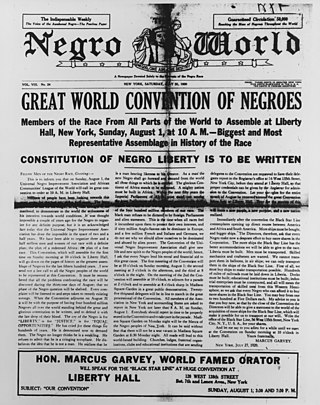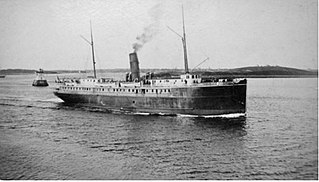Related Research Articles

Marcus Mosiah Garvey Jr. was a Jamaican political activist. He was the founder and first President-General of the Universal Negro Improvement Association and African Communities League, through which he declared himself Provisional President of Africa. Garvey was ideologically a black nationalist and Pan-Africanist. His ideas came to be known as Garveyism.

The pan-African flag is an ethnic flag representing pan-Africanism, the African diaspora, and/or black nationalism. A tri-color flag, it consists of three equal horizontal bands of red, black, and green.

The Universal Negro Improvement Association and African Communities League (UNIA-ACL) is a black nationalist fraternal organization founded by Marcus Garvey, a Jamaican immigrant to the United States, and his then-wife Amy Ashwood Garvey. The African Nationalist organization enjoyed its greatest strength in the 1920s, and was influential prior to Garvey's deportation to Jamaica in 1927. After that its prestige and influence declined, but it had a strong influence on African-American history and development. The UNIA was said to be "unquestionably, the most influential anticolonial organization in Jamaica prior to 1938," according to Honor Ford-Smith.

Garveyism is an aspect of black nationalism that refers to the economic, racial and political policies of UNIA-ACL founder Marcus Garvey.
Black separatism is a separatist political movement that seeks separate economic and cultural development for those of African descent in societies, particularly in the United States. Black separatism stems from the idea of racial solidarity, and it also implies that black people should organize themselves on the basis of their common skin color, their race, culture, and African heritage. There were a total of 255 black separatist groups recorded in the United States as of 2019.

The Black Star Line (1919−1922) was a shipping line incorporated by Marcus Garvey, the organizer of the Universal Negro Improvement Association (UNIA), and other members of the UNIA. The shipping line was created to facilitate the transportation of goods and eventually African Americans throughout the African global economy. It derived its name from the White Star Line, a line whose success Garvey felt he could duplicate. The Black Star Line became a key part of Garvey's contribution to the Back-to-Africa movement, but it was mostly unsuccessful, partly due to infiltration by FBI agents. It was only one among many businesses which the UNIA originated, such as the Universal Printing House, Negro Factories Corporation, and the widely distributed and highly successful Negro World weekly newspaper.

Negro World was the newspaper of the Marcus Garvey's Universal Negro Improvement Association and African Communities League (UNIA). Founded by Garvey and Amy Ashwood Garvey, the newspaper was published weekly in Harlem, and distributed internationally to the UNIA's chapters in more than forty countries. Distributed weekly, at its peak, the Negro World reached a circulation of 200,000.

Hubert Henry Harrison was a West Indian-American writer, orator, educator, critic, race and class conscious political activist, and radical internationalist based in Harlem, New York. He was described by activist A. Philip Randolph as "the father of Harlem radicalism" and by the historian Joel Augustus Rogers as "the foremost Afro-American intellect of his time." John G. Jackson of American Atheists described him as "The Black Socrates".

Henrietta Vinton Davis was an elocutionist, dramatist, and impersonator. In addition to being "the premier actress of all nineteenth-century black performers on the dramatic stage", Davis was proclaimed by Marcus Garvey to be the "greatest woman of the Negro race today".
The Rastafari movement in the United States echoes the Rastafari religious movement, which began in Jamaica and Ethiopia during the 1930s. Marcus Garvey, born in Jamaica, was influenced by the Ethiopian king Haile Selassie. Jamaican Rastafaris began emigrating to the United States in the 1960s and 1970s, and established communities throughout the country.
Whitney Pier is an urban neighbourhood in Sydney, Nova Scotia, Canada. Prior to the 20th century, this area was known as “Eastmount” or “South Sydney Harbour,” and had long been a fishing and farming district. It is a triangle-shaped area North of the Muggah Creek estuary running along the Eastern shore of Sydney Harbour.

Emory J. Tolbert (1946-2022) was an American historian, educator, and activist. His scholarship centers on Marcus Garvey and Garveyism, as well as wider aspects of African American history.
Carlos A. Cooks (1913-1966) was a politician from Dominican Republic.
The Peace Movement of Ethiopia was an African-American organization based in Chicago, Illinois. It was active in the 1930s and 1940s, and promoted the repatriation of African Americans to the African continent, especially Liberia. They were affiliated with the Black Dragon Society.

Black Cross Nurses is an international organization of nurses which was founded in 1920, based upon the model of the Red Cross. The organization was the women's auxiliary of the Universal Negro Improvement Association and African Communities League and was established to provide health services and education to people of African descent.
Robert A. Hill is a Jamaican historian and academic who moved to the United States in the 1970s. He is Professor Emeritus of History and Research Professor at the University of California, Los Angeles (UCLA), and Visiting Fellow at The Sir Arthur Lewis Institute of Social and Economic Studies (SALISES), University of the West Indies at Mona, Jamaica.
Laura Adorkor Kofi, commonly known as Mother Kofi, was a Ghanaian minister and activist associated with the Universal Negro Improvement Association. She was assassinated while preaching in Miami, Florida.
Henry Vinton Plummer, Jr. was an American lawyer, real estate agent, civil rights activist, and black nationalist. In the 1920s he became involved in Marcus Garvey's Universal Negro Improvement Association and African Communities League (UNIA), leading the organizations publicity and propaganda wings, Garvey's secret service, and its militia.

The SS Yarmouth was a steamship notable for its part in developing Yarmouth, Nova Scotia, and connecting it to Boston, Massachusetts. Later in life it had a central role as the flagship of the Marcus Garvey initiative the Black Star Line. Marcus Garvey, known as the "black Moses", was a "back to Africa" evangelist, and his ideas, although radical and controversial in his own time and today, still remain influential. The Black Star Line's name, a play on the White Star Line, is remembered in the flag of Ghana.
J. R. Ralph Casimir was a Dominican poet, editor, journalist and bookseller. A pioneering Caribbean pan-Africanist, he was a founding member of Marcus Garvey's Universal Negro Improvement Association (UNIA), organising its Dominica branch. Casimir also compiled Dominica's first poetry anthologies.
References
- ↑ "Universal Negro Improvement Association". American Experience . PBS . Retrieved 5 December 2024.
- 1 2 Garrett-Scott, Shennette (Summer 2019). "A Commercial Emancipation" for the Negro" (PDF). Financial History. Museum of American Finance . Retrieved 5 December 2024.
- ↑ "Marcus Garvey and the Universal Negro Improvement Association". National Humanities Center . Retrieved 5 December 2024.
- ↑ "Marcus Garvey". The Autobiography of Malcolm X. Columbia University . Retrieved 5 December 2024.
Multimedia Study Environment (MSE) of The Autobiography of Malcolm X, which was produced by the Columbia Center for New Media Teaching and Learning (CCNMTL) in collaboration with Columbia University's Center for Contemporary Black History (CCBH).
- 1 2 Cronon, Edmund David (1960-03-15). Black Moses: The Story of Marcus Garvey and the Universal Negro Improvement Association. ISBN 9780299012137 . Retrieved 2013-11-19– via Google Books.
- ↑ "Negro Factories Corporation". Universal Negro Improvement Association and African Communities League . Retrieved 5 December 2024.
- ↑ Abdellatif, Gabriel (20 April 2017). "Marcus Garvey: A Legacy Obscured by Infamy". Young Historians Conference. Retrieved 5 December 2024.
- ↑ "Marcus Garvey: Leader of the People". Global Black History. 10 February 2012. Retrieved 5 December 2024.
- ↑ "The New Negro Movement". National Association for the Advancement of Colored People (NAACP): A Century in the Fight for Freedom. Library of Congress. 21 February 2009. Retrieved 5 December 2024.